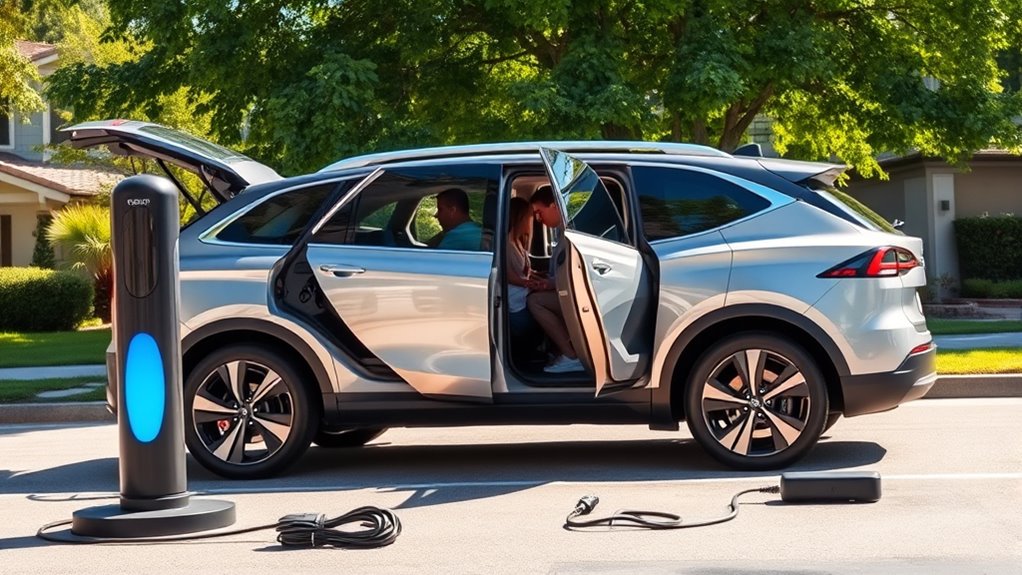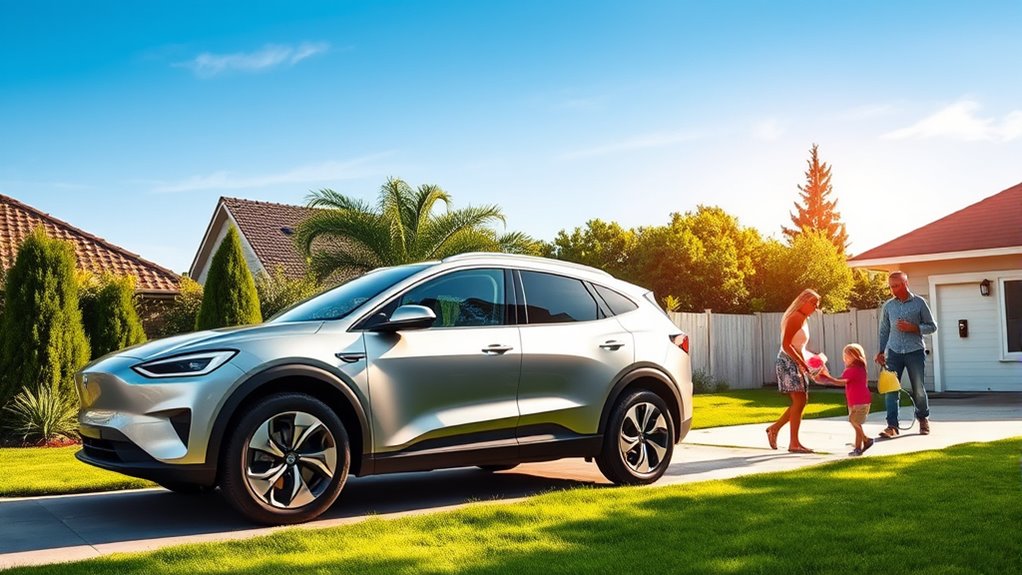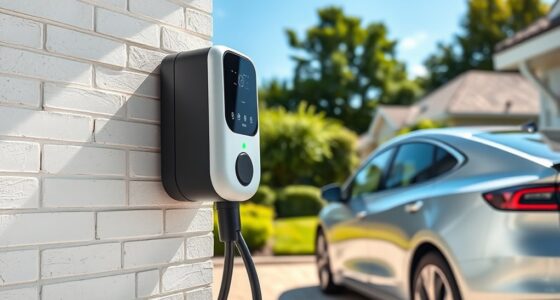Electric cars are a great choice for families because they reduce emissions and improve air quality, offering a healthier environment. They can save you money with lower fuel and maintenance costs, and many models provide spacious interiors perfect for larger families. While charging stations are expanding, long trips might still be a concern. With ongoing improvements and incentives, electric vehicles can fit your lifestyle—keep exploring to see how they could work for your family.
Key Takeaways
- Electric cars produce zero tailpipe emissions, improving air quality and benefiting family health.
- Lower maintenance and fuel costs save families money over the vehicle’s lifespan.
- Spacious models with family-friendly features are widely available, accommodating larger families comfortably.
- Limited charging infrastructure and longer refueling times can be inconvenient for long trips.
- Battery recycling efforts and sustainable energy use make electric cars an environmentally responsible choice.

Electric cars are becoming an excellent choice for families seeking a greener, more cost-effective way to get around. They markedly reduce emissions, helping to improve air quality and create a healthier environment for your loved ones. By choosing electric, you’re contributing to a cleaner planet while enjoying the benefits of a quieter, smoother ride. Plus, these vehicles often come with government incentives like tax credits or rebates, which can make the initial purchase more affordable. Many automakers now offer a variety of electric SUV models, such as the Kia EV9 and Hyundai Ioniq 5, designed to meet the needs of larger families with spacious interiors and third-row seating. This variety ensures you can find an electric vehicle that fits your family’s size and lifestyle.
Electric SUVs like Kia EV9 and Hyundai Ioniq 5 offer spacious, family-friendly designs with eco-friendly benefits.
One of the biggest advantages of electric cars is their lower operating costs. They require less maintenance because they have fewer moving parts and don’t need oil changes or exhaust system repairs. Fuel expenses also drop considerably since charging an electric car is cheaper than buying gasoline. Over time, these savings accumulate, helping your family save money on daily transportation. Additionally, electric vehicles provide a more comfortable driving experience with smooth acceleration and quieter operation, making family trips more enjoyable. Moreover, the expanding charging infrastructure makes it increasingly convenient to keep electric vehicles powered up during long trips.
The growing demand for electric cars reflects their increasing popularity. Globally, over 4 million units were sold in just the first quarter of 2025, and forecasts project the market will reach nearly $907 billion by 2028. Many Americans are now considering electric vehicles seriously, with about a quarter saying they’re very likely to purchase one soon. As market share continues to grow, electric cars are expected to account for more than 40% of all new car sales by 2030. This trend is supported by record sales figures, with the U.S. alone selling over 1.3 million electric vehicles last year.
From an environmental perspective, electric cars produce zero tailpipe emissions, which means cleaner air in urban areas and less contribution to climate change. They can be powered by renewable energy sources, further reducing dependence on fossil fuels. While manufacturing electric vehicles involves some environmental impact, their overall lifecycle tends to be more sustainable. Efforts are also underway to improve battery recycling, minimizing waste and resource consumption. Recognizing the benefits of sustainable energy, more initiatives are focusing on making electric vehicles even more eco-friendly.
Overall, electric vehicles offer a compelling blend of environmental advantages, economic savings, and modern convenience, making them an attractive option for families looking to embrace a more sustainable lifestyle.

FH Group Rear Solid Bench Automotive Seat Cover | Universal Cloth Seating for SUV, Sedan, Van | Washable Car Seat Covers Interior Accessories – Black
COMPLETE REAR SOLID BENCH CAR SEAT COVER PACKAGE: This set includes one rear backrest cover, one rear bottom…
As an affiliate, we earn on qualifying purchases.
As an affiliate, we earn on qualifying purchases.
Frequently Asked Questions
How Do Electric Cars Handle Extreme Weather Conditions?
You might notice that extreme weather impacts your electric car’s performance. Cold temperatures reduce battery efficiency, cutting your range by up to 50%, and heating uses extra energy. Hot weather can improve range but risks battery health if temperatures get too high. Using thermal management systems, adjusting driving habits, and planning your charging can help you manage these conditions better. Some models handle weather extremes more effectively, offering more reliability year-round.
What Are the Long-Term Maintenance Costs for Family Electric Vehicles?
You might worry about long-term costs, but electric vehicles usually require less maintenance than traditional cars. You’ll save on oil changes, brake repairs, and engine tune-ups, with battery warranties covering most issues for years. While battery replacement can be costly, advances are lowering those expenses. Plus, you’ll benefit from lower fueling costs. Overall, your long-term maintenance costs tend to be more predictable and often lower, easing your family’s budget over time.
Are Electric Cars Suitable for Large Families With Multiple Children?
You wonder if electric cars suit large families with multiple children. Today’s electric SUVs, like the Kia EV9 and Tesla Model Y, offer spacious interiors, up to seven seats, and good range for daily trips. While charging infrastructure is improving, long trips may still pose challenges. If you prioritize eco-friendliness, safety tech, and ample space, electric cars can be a practical, comfortable choice for your family’s needs.
How Does Charging Infrastructure Vary Across Different Regions?
You’ll notice that charging infrastructure varies greatly across regions. In North America, rapid growth is driven by government support and private investments, leading to widespread, high-tech charging stations. Europe’s mature network emphasizes standardization, while Asia-Pacific is rapidly expanding high-speed and connected chargers. These regional differences stem from policies, market maturity, and technological focus, affecting how easily you can charge your electric vehicle wherever you travel or live.
What Safety Features Are Unique to Family-Oriented Electric Cars?
When it comes to safety features in family-oriented electric cars, you get more than just the basics. You’ll find advanced airbags, blind spot monitoring, and lane departure warnings that keep everyone safe. Plus, features like rear-seat sensors, ISOFIX mounts, and pedestrian detection are tailored for family needs. These cars really put safety front and center, making sure you’re covered from every angle while you focus on the road ahead.

First Ride On 24V 2 Seater Ride on Car for Kids, Licensed Chevrolet Silverado Electric Car for Kids with Remote Control, Toddler Car with Bluetooth, LED Lights, Seat Belts and Spacious Design (White)
LICENSED CHEVROLET SILVERADO DESIGN: This officially licensed Chevrolet Silverado ride on toy delivers a realistic driving experience with…
As an affiliate, we earn on qualifying purchases.
As an affiliate, we earn on qualifying purchases.
Conclusion
While electric cars offer many advantages, they also come with their own set of gentle challenges. Embracing this modern option can bring a smoother, quieter ride for your family and help you contribute positively to the environment. With a little planning and patience, you can navigate these new roads comfortably. Ultimately, choosing an electric vehicle can be a delightful step toward a more sustainable and enjoyable family journey, making each mile feel a little more special.

EVDANCE Level 1&2 EV Charger, Electric Vehicle Portable Charger with 25FT Cable, Home EV Charging Station for J1772 Electric Cars, 12A 120V/16A 240V, NEMA 5-15 & NEMA 6-20 Plug
Flex Level 1 EV Charger – The EVDANCE Level 1 electric car charger is compatible with J1772 electric…
As an affiliate, we earn on qualifying purchases.
As an affiliate, we earn on qualifying purchases.

Heated Blanket – 12-Volt Electric Blanket for Car, Truck, SUV, or RV – Portable Winter Car Accessories for Camping or Travel by Stalwart (Black Plaid)
CAR BLANKET – This Stalwart travel blanket is made of soft polyester fleece in a stylish black plaid…
As an affiliate, we earn on qualifying purchases.
As an affiliate, we earn on qualifying purchases.










